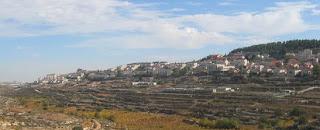"Do you want to spend Shabbat with some seminary girls?" she asked.
I should explain. Last week, Alissa began a month of learning for Elul at Nishmat, a women's seminary in Jerusalem. As part of the programme, Nishmat had organized a Shabbaton in Efrat with Rabbi Menachem Schrader and his family. Husbands were invited.
Let me think: Jewish learning. Free food. A tour of Efrat. Seminary girls. I could imagine quite a few yeshiva boys have dreams about weekends like this. Ok, I'm in.
On Friday afternoon, we met up with the group at the school . Of course, as things turned out, I was the only husband other than that of the group leader, and his English is about as good as my Hebrew. But, this would give me a chance to practice conversational Hebrew. The girls seemed friendly and bright, even if I felt a little like a one of the parental chaparones on an overnight High-School excurison.
After loading up our things, we set off by bus to Efrat. After crossing the checkpoint, it was a short drive to Efrat, located in the heart of an area south of Jerusalem called Gush Etzion, situated between Beth Lechem and Hevron. Efrat is relatively small, around 8,000 mainly religious Zionists, and was established in 1980.
It's impossible to visit the region without recognizing the political situation. The West Bank is complicated, to say the least. There had been a perpetual Jewish presence since Biblical times until the illegal Jordanian occupation in 1948 when Jews were expelled - many were killed or injured when the Jordanian army destroyed the Etzion Block - and prohibited from visiting religious sites.
Sadly forgotten by many is the fact that Jews are called "Jews" because they come from Judea, the historic name for this area. This unassailable historical fact was the basis for the Balfour Declaration (1917), endorsed by the San Remo Convention (1920) and the League of Nations (1922), confirming the Jewish people's right to live in the Holy Land, on both sides of the Jordan River. So, according to International law, Jews have every right to buy land and settle in this region.

And so, entering Efrat we feel like we are coming home. There is a visceral familarity to the landscape and the expansive sky, and I dwell upon the words of Moshe to the people Israel, "For the Lord your God is bringing you to a good land: a land with streams of water, of springs and underground water coming forth in valley and mountain; a land of wheat, barley, grape, fig and pomegranate, a land of oil-olive and date-honey; a land where you eat bread without poverty--you will lack nothing there."
We arrive at the home of the Rabbi and immediately the process of assigning billets begins. The Rebbetzin and Rabbi have decided to send the girls to homes based on dietary restrictions: vegans to this home, vegetarians who eat fish to these people, omnivores who can't eat nuts...you get the idea. I turn to the Rabbi and say, "I eat EVERYTHING!" (In truth, Alissa prefers not to eat meat but she's far more accomodating than me). He says, "Well, there's the Bogners."
"Huh? David and Zahava Bogner?"
"Oh, do you know them?"
"We know of them. And we've commented on each other's blogs."
"Well, they're just down the street." And once we had the address, we were off to the home of Bogners, known by many as 'Chez Treppenwitz.'
If you want to know what happened next, you can read here.




2 comments:
The pleasure was all ours. Stop by anytime!
And we got to play house + dog! (And then return him!)
Everybody wins!
Post a Comment